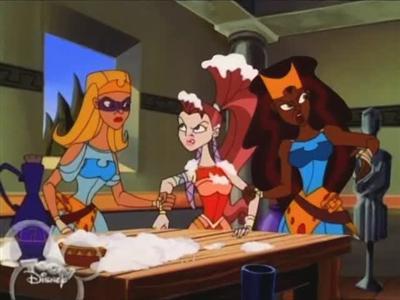The
ninth labor imposed on Hercules by Eurystheus, was to bring back the precious
girdle of Hippolyte, queen of the Amazons. She was the daughter of Otrera and
Ares (the god of war). It was Admete, the daughter of Eurystheus, who begged her
father for the possession of this symbolic girdle (it gave supremacy and power
to the wearer). The Amazons were an all female race and is believed that they
lived in the mysterious lands in the north, their capital Temiscyra, lying on
the slopes of the Caucasus.
To
execute this expedition Hercules had to organize a group of volunteers, among
them were Telamon and Theseus. They armed a ship, expecting the Amazons to be
hostile against them, then set sail on their long

Scene
from Disney’s movie “Hercules”
voyage.
But when they reached Temiscyra on the mouth of the river Thermodon, they were
unexpectedly welcomed by the Amazon women, especially by Hippolyte, who was
charmed by the looks of the heroic band. Hercules explained to Hippolyte the
reason for their expedition to her far off land, to which Hippolyte replied, you
are welcome to take the girdle as a gift. Hera, on hearing this, took the form
of an Amazon, and then spread a rumor that Hercules had come to steal away their
queen, and take her back with him to Greece. The female warriors, in protection
of their queen, began fighting the heroes, and in the fierce battle that ensued,
Hippolyte was killed by the hands of Hercules, thinking she had betrayed him.
After
the battle had been won, Hercules took the girdle and they all made their way
home. On their return voyage Hercules saved the life of Hesione, daughter of
Laomedon, king of Troy. To save her Hercules killed a sea-monster, to which
Hesione was to be sacrificed. This was after a dispute Laomedon had with Apollo
and Poseidon. The gods had built the walls surrounding Troy, but Laomedon
refused the payment he had promised. Apollo sent a plague and Poseidon a
sea-monster. The only way to rid these curses was for Laomedon to sacrifice his
daughter. Hercules was also promised payment, a team of horses, but after
Hercules rescued Hesione, the king once again refused payment. Hercules gave
Hesione to Telamon, his companion in arms who married her, then took her to
Salamis in Greece.
Hercules in retribution killed Laomedon and his sons, but spared, at the request of Hesione, Podarces the youngest son, who later became known as Priam, which means “bought or ransomed” because Hercules exchanged him for a beautiful veil, which Hesione had embroidered with gold.